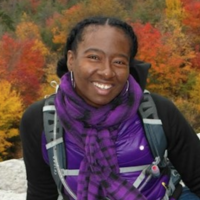Doubts are a Reminder to Engage More, not Educate More
December 20, 2018
As environmentalists, fully persuaded that climate change is real, it can be hard to accept that others doubt this fact or the need to act quickly to stop it. In our minds, the evidence is so overwhelming that the only logical explanation for doubt must be willful ignorance. This apparent denial can leave us feeling frustrated and angry. However, my experience as an intern this summer has taught me to welcome expressions of doubt. Why? Because doubts are a reminder that needs have not been met.
When I saw the application to be an Environmental Fellow, I doubted it was for me because my plan was to find a job in government where I would get a decent salary, benefits, and a pension to retire on. I didn’t see myself working in a small nonprofit, getting burnt out from the double stress of barely making enough money to feed myself and feeling like I was David taking on Goliath every day. But, after weeks of searching, I realized that while government internships paid almost nothing, the Environmental Fellows Program would pay me well right now. My doubts about the suitability of nonprofit work in my future were overcome by the certainty that a nonprofit internship was in my best interest this summer.
Thank goodness the Environmental Fellows Program took the step of helping me to meet my immediate needs rather than asking me to join them on principle alone! If they hadn’t, I might never have known that there were nonprofits that I could see myself working at. The Environmental Defense Fund’s offices in New York were the complete opposite of what I had expected from a nonprofit; they included an in-house gym, kitchen with a wide selection of gourmet coffees and teas, and happy employees that had been there for decades. Even EDF’s strategy defied my expectations: rather than going to war against Goliath every day, employees worked with Goliath to help him find a path that benefitted everyone.
I was proud to be a part of such a great organization. But, deep down, I still doubted that I belonged there those first few weeks. I didn’t have a science or engineering background like the other interns. In unfamiliar territory, I doubted my understanding of even the most basic words and paused my reading often to Google information. My constant questioning and slowness to complete the readings frustrated my team at times. However, my experience living in numerous countries over the years had taught me the danger of not checking for a different meaning when the context had changed.
My doubts, it turned out, were part of an important skillset that I had not fully recognized I possessed, nor had my team initially realized that it needed: the patience to sort through assumptions in search of commonalities. My deeper understanding of the reports allowed me to write policy briefs more quickly and concisely, and to give senior staff more response options when I presented them with talking points. As the weeks passed, my colleagues asked for my opinion on their work more and my sense of belonging grew.
I am grateful to the Environmental Fellows Program for showing me that I could both make a comfortable living at an environmental nonprofit and make important contributions to policy development outside of government. However, I also wish that the program weren’t necessary. If more environmental groups recognized doubts as a plea for more engagement rather than a need for more education, then they would not have so much difficulty recruiting and retaining diverse candidates.
A person doubts what they don’t find relevant to their lives and, sadly, many environmental groups have failed to make themselves relevant to minority communities. They campaign for icebergs for polar bears while people of color lose their homes to gentrification, their families to a biased criminal justice system, and their voices to corporate dollars in politics.
From environmental boardrooms to magazine covers, it appears that minorities are primarily seen as just another species to be saved, rather than as equally qualified team members with whom to co-create campaign agendas. This must change.
I hope that all environmental groups will use the Fellows Program as a model to increase their diversity, removing present and future doubts by sharing resources to meet immediate needs and showing that the person’s current skills are valuable to the organization. Then, many others may be happily surprised, like I was, to find a place for themselves in an environmental nonprofit.
About Tiffany Taulton
